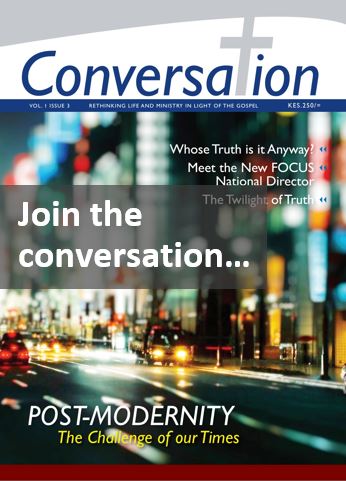
One of the best and most challenging pieces of feedback I have ever received in my preaching journey is to be myself. A friend listened to one of my talks and said everything I expected them to say except this one. They thought the sermon was faithful to the text though I could have gone even further. It engaged with the audience although it could always be better. The state, point, explain, illustrate and ground the text route was followed. But they didn’t feel like the Peter who was preaching was the Peter they had spent the previous evening cracking jokes with.
Now, for most of us who recommend expository preaching that doesn’t sound like where we want to start. To counter the culture where false teaching and glorified MoGs (men of God) take centre stage my reaction is always to say preach the word brother. Let your structure and content be shaped by the text. Read it like ten times and read around it to be very familiar with it. Make sure your nose is in the text and that people leave hearing from Paul or Nehemiah not you. Better still, make sure to move out of the way of the word. We even make that prayer, don’t we? God please use me and help me not to be a barrier to your people. It, therefore, sounds almost unfaithful to say that the preacher, his unique personality and temperament matters too. To say that people should yearn to hear from the preacher not only because of the text in mind but because of their unique personality.
But the more I have thought about this the more I’m convinced that the preacher matters too. Haven’t you listened to someone preach and wondered if that was the same person you knew? You know that’s Josh but he sounds like that other televangelist. Or worse, their personality is so removed that they sound like a robot. I would say there are three boxes we need to tick off before we stand to preach. One, the word has to be in the driving seat. The word matters otherwise you shouldn’t call yourself a preacher of the word. Secondly, people matter, especially the people you speak to regularly. You need to know how they process information, what ticks them and what they are struggling with so that you can bring the word to bear in their lives. But that’s not all. The preacher matters too. The reason why God has given you that opportunity is so that you can speak his word to his people but as a person, not a robot. Your unique personality matters too.
Who is this Imposter?
My friend loved the sermon I gave. They thought it spoke to the people to some extent but he was unsure of the man behind the pulpit. To him, he was an imposter, not the man he knew. Now, you would think that’s okay, after all God’s people heard what God wanted to say. But I would actually say that to some degree the preacher is unfaithful when that happens. Why? Because he leaves the impression that we come to God’s word not as ourselves but as our imagined better or mostly boring selves. It leaves those aspiring to be preachers thinking they need to copy someone else in order to preach God’s word. And for those who know us, it leaves them confused about how to relate with us. Should they deal with me as the Peter they know who is free with them or the Peter who stands before them to preach and is all serious and inaccessible. I would think when God gives us an opportunity to serve his people he doesn’t require us to completely overhaul our personality. It needs to come out in our preaching. Yes, different passages will need us to check our tone but we never need to change our personality.
Just think about the more than forty different authors of the Bible. It’s easy to assume only God’s voice and his audience matter. That it’s all about what God has said and what his people hear. But then again he uses Moses one time, then he goes to David another time, then Isaiah, Ezra, Micah, Luke, Paul, Peter, James, Jude… Now imagine reading Paul’s epistles but he sounded like David writing the Psalms or Moses with Deuteronomy. The Bible would be one boring book. Actually, there would be no need for human authors. God could easily have spoken from heaven and had Moses record everything for all generations after him like the Quran.
Be Yourself
But no, God spoke over time using people with their unique personalities. Actually, when you read the Bible carefully you can’t help but see how the individual authors come across. You need your thinking gear when reading Romans. You prepare your heart when reading the Psalms. Your philosophy is challenged when the preacher in Ecclesiastes is speaking. Hebrews turns your world upside down and you move quickly with Mark in his Gospel. You enjoy the narratives in Exodus. You love John’s depth in his Gospel. Your mind is blown away by the prophecies of Isaiah and you can relate with Nehemiah. But none of these are devoid of the human author’s unique personality. The truth is most of the time the genre is shaped as much by the audience as it is by the author. Imagine if it was Paul writing the Psalms. Or Peter with Revelation. What about Moses writing Romans. Or Isaiah with Song of Songs. The message could still be upheld to an extent. The people would still hear something from God but it wouldn’t come across the same way. Like my friend, they would wonder who this imposter was and that would affect how they received the word. Thank God that he used these people with their unique personalities. Praise him that his own son took a human personality and he was always himself.
So as you prepare to preach do all you can to understand the text. Be faithful to the word. Do all you can to know and relate with your audience. Be faithful to the people. But as my friend advised be yourself. Yes, John Piper makes for a good preacher. Tim Keller too. Don’t you wish you could be Spurgeon or Martyn Lloyd-Jones? Maybe Dick Lucas or Philip Jensen. But you can’t and you shouldn’t be. Instead, use the route they follow but remain yourself. Be faithful to the word. Faithful to your congregation. But also be faithful to yourself. Preach the same word with vigour but as yourself. If God didn’t think the preacher matters then he wouldn’t have called you. He would have had Moses record all our sermons and our churches would merely be synagogues where the word is read but not explained or applied by unique preachers to specific congregations. Preach the word. Feed the Lord’s sheep. But do it with all you have. Be the man they know and relate with not the man you wish was their pastor. God has called you. Be yourself.















